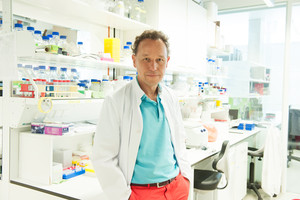

Christian Haass and coworkers have detected early signs of Alzheimer’s in the cerebrospinal fluid. Source: LMU
Researchers at the Munich site of the German Center for Neurodegenerative Diseases (DZNE) and the hospital of the Ludwig Maximilian University (LMU) Munich have now found an early immune response in individuals with a genetic predisposition to Alzheimer‘s: their brain’s showed abnormal immune reactions as early as about seven years before the expected onset of dementia.
These results demonstrate that in cases of Alzheimer‘s, inflammatory processes in the brain evolve dynamically and are precursors of dementia.
These immune responses can be detected by means of a protein in the cerebrospinal fluid, offering physicians the possibility to trace the progression of the disease. The study results are published in the journal “Science Translational Medicine”.
Original Publication
„Early changes of CSF sTREM2 in Dominantly Inherited Alzheimer’s Disease follow markers of Amyloid Deposition and Neuronal Injury“, Marc Suárez-Calvet, Miguel Ángel Araque Caballero, Gernot Kleinberger, Randall J. Bateman, Anne M. Fagan, John C. Morris, Johannes Levin, Adrian Danek, Michael Ewers, Christian Haass, Science Translational Medicine, DOI: 10.1126/scitranslmed.aag1767
https://www.dzne.de/en/about-us/public-relations/news/2016/press-release-no-23.h… Complete press release












